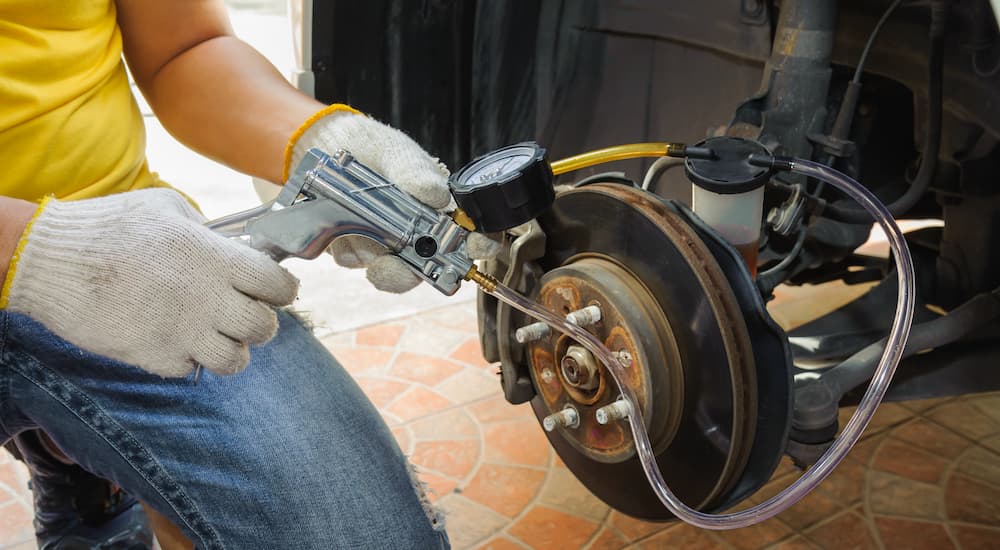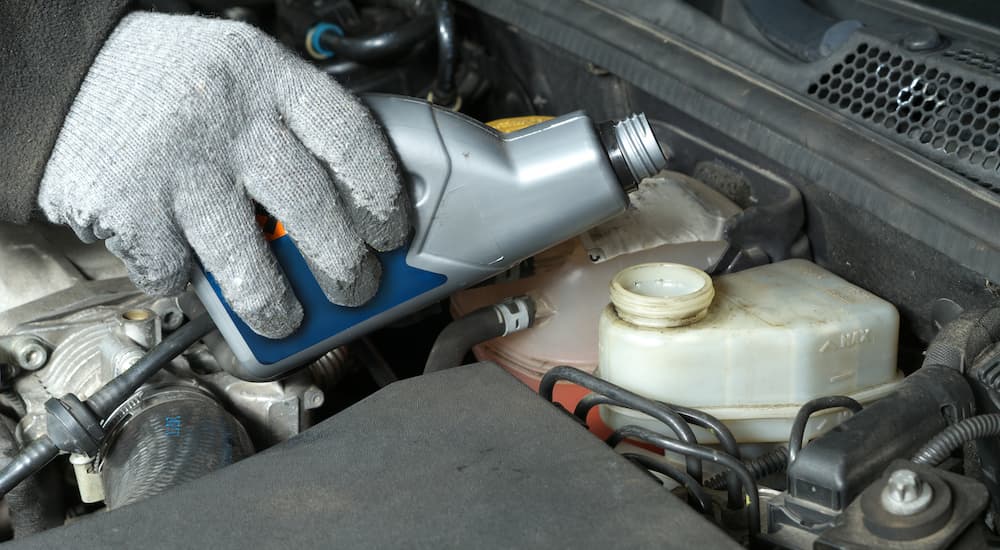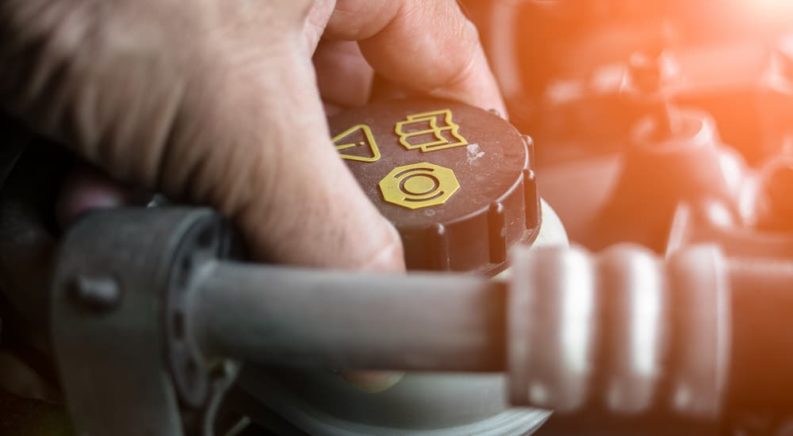There is a lot to keep up with when it comes to maintaining your car, especially if you are the DIY type that doesn’t rely on a mechanic to take care of it all for you. As you keep tabs on the engine oil, air filters, tires, lights, and more, it can be easy to forget about one of the most important safety features on your car––the brakes. Now, you’re probably aware when your rotors start getting bent out of shape, or your brake pads start wearing out, you may even inspect the brake lines occasionally, but when was the last time you changed your brake fluid? It is an important question to ask that will determine whether it is time to think about car brake service or not.
Brake fluid is easy to neglect because it quietly does its job in the background and doesn’t give any obvious warning signs when it needs to be replaced––right up until you’re traveling down the side of a mountain and the pedal goes to the floor because the brake fluid started boiling. In fact, many drivers are not even aware that brake fluid is generally supposed to be changed every two to five years. If you have never changed the brake fluid in your car, it might be time to get it done. But don’t worry; the process is actually quite simple and can be easily handled by anyone with a bit of DIY experience.
What Is Brake Fluid?
While it may seem surprising, modern hydraulic brakes first made their appearance on the 1921 Duesenberg Model A, over a decade after the famed Model T hit the road, and they didn’t become common on mass-market cars until the 1930s! Up until then, cars used simple mechanical linkages to activate the brakes, which meant that the brakes could only exert as much force as the driver could apply through the pedal (or more commonly at the time, the brake lever). Hydraulic brakes take advantage of mechanical principles to multiply the force applied by the driver, allowing you to stop a several-ton vehicle with a light press of your foot on the brake pedal.
When you push the brake pedal, it activates the master cylinder under the hood. This, in turn, forces brake fluid through the brake lines running to the brake calipers on each wheel. Because liquids are essentially incompressible, any force exerted on the master cylinder is applied equally to the calipers. However, this system relies on fresh brake fluid completely filling the lines. If anything goes wrong with your brake fluid, your brakes will simply cease to function as none of the force applied to the pedal will make its way to the wheels. This is why it is vital to monitor your brake fluid and replace it regularly.

How Long Does Brake Fluid Last?
There are three main issues that can affect your brake fluid. The first is simply damage to your master cylinder, brake lines, or calipers, creating a leak. While bad brake fluid can rust out brake lines from the inside, leaks are usually caused by exterior damage and can be caught by simple visual inspections. The second issue is air bubbles in your brake lines. Unlike brake fluid, air is compressible, and any bubbles will reduce the amount of force transmitted to the calipers. The good news is that your brakes are a sealed system, so air bubbles are not common as long as you keep the brake fluid topped off, and they can be removed by bleeding your brakes.
The third and most important issue is that most types of brake fluid are hygroscopic––they absorb water over time. This is an intentional design choice as it helps prevent any moisture from rusting out the brake lines. However, as your brake fluid absorbs water, its boiling point decreases. This is critical because brakes generate immense amounts of heat and can reach temperatures of 400 degrees in normal driving conditions. All of that heat has to go somewhere, and some of it will start heating up your brake fluid. If your brake fluid reaches its boiling point, then it will phase shift from liquid to gas, and none of the force you apply to the brake pedal will get to the calipers.
Unfortunately, there are no hard and fast rules for knowing when your brake fluid has become so contaminated with water that its boiling point has dropped significantly. Every manufacturer has its own recommendations, and some of them will depend on the climate where you live and your driving style. If you want to play it safe, then consider changing your brake fluid every two years. However, if you drive conservatively in a relatively flat area, then up to a five-year interval can be perfectly safe. Conversely, if you drive a large truck and are regularly towing on mountain roads or have a sports car that you regularly take to track days, then you may want to change your brake fluid annually.
Types of Brake Fluid
Not all brake fluid is created equal. In fact, there are several distinct grades of brake fluid that you will find at your local parts store, and it is critically important that you use the right brake fluid for your vehicle. Your owner’s manual will list the correct brake fluid type, and it will usually be printed on the master cylinder cap as well. Using the wrong type can dramatically increase your chances of boiling your brake fluid and in the case of DOT 5 fluid, can severely gunk up your entire brake system. However, this doesn’t mean there is no room to make some upgrades, providing you know what you are doing.
All modern brake fluid falls into four basic categories, certified by the United States Department of Transportation (DOT). Still, it should be noted that these categories are merely minimum standards. Higher quality brake fluid will improve performance even if it is nominally the same type as a lower quality brake fluid.
DOT 3
The oldest and most common type of brake fluid, DOT 3, is affordable and can be found in a wide range of vehicles. Fresh from the bottle, it has a “dry” boiling point of at least 401 degrees. The “wet” boiling point, after it has absorbed a significant amount of moisture, is at least 284 degrees. DOT 3 should be considered the baseline for modern vehicles but should never be used to replace higher-rated brake fluid.
DOT 4
DOT 4 is an upgrade over DOT 3 and is found on many modern vehicles. Although both fluids are made from glycol ether, DOT 4 contains borate-ester additives to improve its performance. The changes give it a dry boiling point of at least 446 degrees and a wet boiling point of at least 311 degrees. DOT 4 fluid can be used to replace DOT 3 fluid, but it tends to be significantly more expensive.
DOT 5
Unlike DOT 3 and DOT 4, DOT 5 brake fluid is made from silicone rather than glycol ether. This means that it does not absorb moisture and performs well over a wide range of temperatures. It also has a very high dry boiling point of at least 500 degrees, with a wet boiling point of at least 356 degrees. However, it does not interact well with ABS systems and should never be mixed with non-silicone brake fluids. DOT 5 is almost exclusively found in classic cars and military vehicles.
DOT 5.1
While it has a similar name to DOT 5, DOT 5.1 is a glycol ether fluid just like DOT 3 and DOT 4. This means that it can be used to replace the more common brake fluids, and it has the same 500-degree dry boiling point and 356-degree wet boiling point as DOT 5. However, it is important to remember that these boiling points are merely minimum specs. Many of the best brake fluids are marketed as DOT 4 even though they exceed DOT 5.1 standards for dry and wet boiling points.

Don’t Neglect Your Brake Fluid!
You won’t find many people willing to argue that your brakes aren’t important––which is why it’s time to pay attention to your brake fluid! Inspecting the brake lines and changing the pads and rotors are all important maintenance tasks, but don’t forget to replace your brake fluid as well. It’s easy to overlook, but making sure that your car is topped off with fresh brake fluid will give you the peace of mind you need when you start giving your brakes a hard workout. Brake fluid is the unsung hero, keeping you safe on the road, and it is time to give it the recognition that it deserves!

